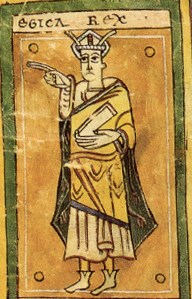Egica
This article has multiple issues. Please help improve it or discuss these issues on the talk page. (Learn how and when to remove these template messages)
|
| Egica | |
|---|---|
 Egica in the 9th-century Codex Vigilanus | |
| King of the Visigoths | |
| Reign | 15 November 687 – 701/703 |
| Predecessor | Erwig |
| Successor | Wittiza |
| Born | c. 640 Visigothic Kingdom |
| Died | 701/703 Visigothic Kingdom |
| Spouse | |
| Issue | Wittiza Oppas |
Egica, Ergica, or Egicca (c. 640 – 701/703), was the
Accession
He was married (c. 680) to
Notable events
In 691, Egica oversaw the beginning of the building of the Church of San Pedro de la Nave in Zamora.
In 693, the
Legislation
In 693, Egica enacted severe anti-
Shortly before he died, Egica amended a law that stated that anyone accused of theft of goods worth 300
Death and succession
As early as 694 he co-ruled with Wittiza, his son by Cixilo, even though Wittiza was a minor. In one of his very last acts he had Wittiza anointed in 700. Egica died in his bed, with his succession secured, sometime between 701 and 703.
His other two sons were
, as did his son Ataulfo, his grandson Atanarico and his great-grandson Teudo in 770, 801/802 and 805.Sources
- Collins, Roger. The Arab Conquest of Spain, 710–97. Oxford University Press, 1989.
- Collins, Roger. Visigothic Spain, 409–711. Blackwell Publishing, 2004.
- Thompson, E. A. The Goths in Spain. Oxford: Clarendon Press, 1969.
Notes
- ^ "Egica | Real Academia de la Historia" ['Royal Academy of History']. dbe.rah.es. Retrieved 2023-04-12.
- ^ Collins, Visigothic Spain, 105.
- ^ Collins, Visigothic Spain, 72.
- ^ David Noy, Jewish Inscriptions of Western Europe: Volume 1, Cambridge University Press, page 264.
- ^ https://www.jstor.org/stable/1853939
